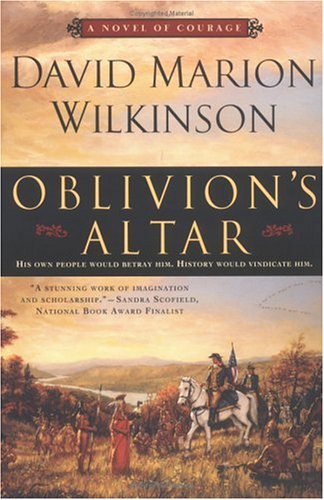Oblivion’s Altar
This fictional biography of Ridge Walker, a mixed-blood Cherokee leader, unflinchingly depicts his Nation’s travails from the years of the American Revolution to the infamous forced westward march along the Trail of Tears. Wilkinson conveys the inward and outward conflicts as the determined Ridge carves out his own path, diverging from the ways of his father’s people by having his own son, John Ridge, educated in New England, and prevailing against the Creeks in battle.
Farming what they regard as their sacred ancestral lands, Ridge and his wife Sehoya acquire slaves and fill their house with objects imported from England. Even as they adopt the methods of white planters, they cherish tribal habits, customs, expectations, and responsibilities. Ridge seeks to guide his people along the safer path, journeying to Washington as necessary to meet a succession of White Fathers, relying on his eloquent, charismatic, mission-educated son to mediate and translate. Ultimately Ridge must cast himself out of his own Nation, and pays a heavy price for his vision of a lasting heritage. Education, intermarriage, and political involvement seal the fate of his increasingly “civilized” people, who present a greater threat to the US government than when they hunted in forests and fished the rivers.
First-person accounts from Andrew Jackson, Sehoya, and those Cherokees who chafe at the Ridges’ leadership provide perspective. Despite occasional stiffness of dialogue and a tinge of political correctness, the novel offers a meticulously researched and moving presentation of Indian sufferings and subjugation.










